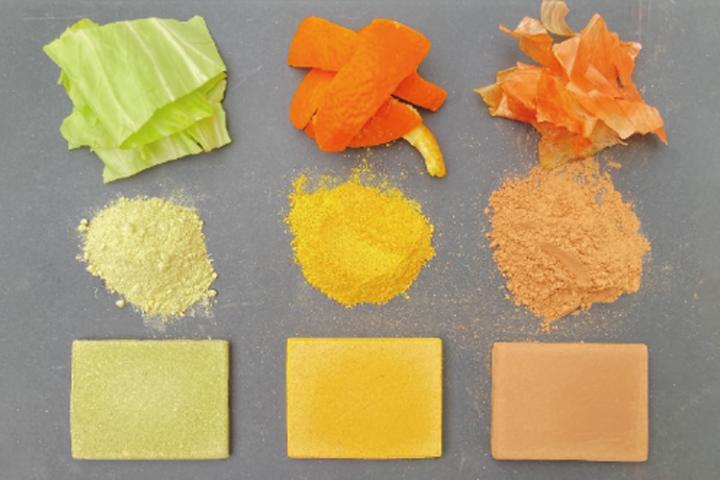
Credit: Institute of Industrial Science, the University of Tokyo
Tokyo, Japan – Most people don’t think much about the food scraps they throw away; however, investigators from the Institute of Industrial Science at The University of Tokyo have developed a new method to reduce food waste by recycling discarded fruit and vegetable scraps into robust construction materials.
Worldwide industrial and household food waste amounts to hundreds of billions of pounds per year, a large proportion of which comprises edible scraps, like fruit and vegetable peels. This unsustainable practice is both costly and environmentally unfriendly, so researchers have been searching for new ways to recycle these organic materials into useful products.
“Our goal was to use seaweed and common food scraps to construct materials that were at least as strong as concrete,” explains Yuya Sakai, the senior author of the study. “But since we were using edible food waste, we were also interested in determining whether the recycling process impacted the flavor of the original materials.”
The researchers borrowed a “heat pressing” concept that is typically used to make construction materials from wood powder, except they used vacuum-dried, pulverized food scraps, such as seaweed, cabbage leaves, and orange, onion, pumpkin, and banana peels as the constituent powders. The processing technique involved mixing the food powder with water and seasonings, and then pressing the mixture into a mold at high temperature. The researchers tested the bending strength of the resulting materials and monitored their taste, smell, and appearance.
“With the exception of the specimen derived from pumpkin, all of the materials exceeded our bending strength target,” says Kota Machida, a senior collaborator. “We also found that Chinese cabbage leaves, which produced a material over three times stronger than concrete, could be mixed with the weaker pumpkin-based material to provide effective reinforcement.”
The new, robust materials retained their edible nature, and the addition of salt or sugar improved their taste without reducing their strength. Furthermore, the durable products resisted rot, fungi, and insects, and experienced no appreciable changes in appearance or taste after exposure to air for four months.
Given that food waste is a global financial burden and environmental concern, it is crucial to develop methods for recycling food scraps. Using these substances to prepare materials that are strong enough for construction projects, but also maintain their edible nature and taste, opens the door to a wide range of creative applications from the one technology.
###
The work will be published in the proceedings of The 70th Annual Meeting of The Society of Materials Science, Japan as “Development of Novel Construction Material from Food Waste”
About Institute of Industrial Science (IIS), the University of Tokyo
Institute of Industrial Science (IIS), the University of Tokyo is one of the largest university-attached research institutes in Japan.
More than 120 research laboratories, each headed by a faculty member, comprise IIS, with more than 1,000 members including approximately 300 staff and 700 students actively engaged in education and research. Our activities cover almost all the areas of engineering disciplines. Since its foundation in 1949, IIS has worked to bridge the huge gaps that exist between academic disciplines and realworld applications.
Media Contact
Yuya Sakai
[email protected]
Original Source
https:/




